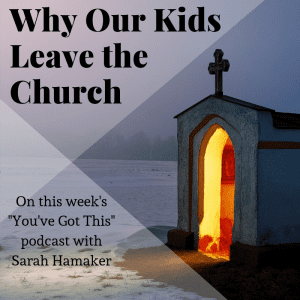
The following is an excerpt from my interview with Susan Nelson on my podcast, You’ve Got This.
Susan Nelson is a writer, speaker and the creator of Women of Noble Character ministries. She is passionate about helping Christian women live a Proverbs 31 life in today’s world. The Lord laid upon her heart to serve women to grow in Christ, improve their marriages and manage their homes stress-free. She provides tools and resources on her website for Christian women to grow in their faith, deepen their relationship with their husbands and manage their homes well. She lives in rural North Central Missouri with her handsome and hilarious husband and a myriad of dogs, cats and chickens. Susan runs on Jesus, coffee and not enough sleep.
As a Christian parenting coach, I often get this question: How to get kids interested in church. Why is it important for kids to be in church?
Susan: For one, church is the place where we springboard our faith. It’s where we get soaked in the Word and learn to grow in our faith. Without church, we lose that teaching, we lose that fellowship, we lose that opportunity to be plugged into other believers who help us on our walk. As Hebrews 10:25 says, “Not giving up meeting together as some are in the habit of doing, but encouraging one another and all the more as we see the day approaching.” That is confirmation that is what God wants us to do—He wants us to be together, he wants us to be in church and in fellowship with him and each other.
Our church has a lot of emphasis on family worship at church, we don’t have a children’s church but we do have nursery. We’re expected and encouraged, especially when our kids were young, to train our kids to be in the service with us. That was challenging sometimes, and that was discouraging other times—you thought you’d never hear a full sermon again. Now my kids can sit through an hour and a half of church. And not just sit there, but they’re engaged, they’re taking notes, they’re listening and learning. But I find that we’re in the minority these days. When I talk to parents, this is what they want—they know that family worship is important.
Susan: There’s a debate on both sides on whether or not have young children in the general services and to have children’s church—that’s a topic for another conversation. But when children see parents leading by example, seeing them in church, seeing them participate in the worship, seeing them take notes, seeing them refer to their Bible—when the parents are leading and doing all of those things, the children are more likely to embody and to mimic their parents’ behavior to grow in their own faith. That’s really one of the reasons why I think children leave the church when they grow up because they were not taught proper behavior in how to grow in Christ.
When we think about living our faith, it’s not just taking them to church and everyone goes their separate ways. There’s something precious about sitting around your dining room table after church and everyone discussing the same sermon.
Susan: It does send a message to children that they don’t want them in church. I do understand the need to sometimes teach on their level. 70 percent of children stop attending church when they graduate from high school, which is just an unbelievable and heart-breaking number. A decade later, only half of those had returned to church. What they’ve found is that these are mainly children of what the studies called nominal Christians. Those who go to church, drop their kids off, say a prayer at meal time, but other than that, God is not important. If we are not modeling behavior that church is important, prayer is important, Bible study time is important, our children are not likely to follow in our footsteps. The parents who are not practicing what they preach are the ones who are more likely to have their children leave the faith after high school.
That’s a sobering statistic. What we’ve tried to do is integrate church into our lives by discussing the sermon during Sunday lunch. Our family takes Sunday as the Sabbath very seriously, by not going out to eat, no sports that regularly meets on Sundays or birthday parties, etc. When we show the importance of it by our lifestyles, that helps our kids make those connections stronger.
Susan: I found this quote by Dennis Rainey that I think lives this out: “Christianity cannot be a spectator sport. You’ve got to be on the field. If you want to impact your children and have a hope, a realistic hope of your children getting their own faith, then they need to see you on the playing field engaged in the game. And we’re not talking about just church attendance here. It’s an infectious love for Jesus Christ, representing Him, living out the Scriptures, being obedient to the Scriptures, making decisions in light of how this furthers God’s kingdom.”
We can’t just live by going to church on Sunday if the rest of our life is not reflecting those values and what’s being taught in his word.
It’s not that hard to do. It’s not that difficult. Start out with having a family prayer time.
Susan: I think this is as important too—demonstrating a strong, God-first marriage. Children who hear constant argument and stress between their parents, they’re going to think this behavior is acceptable, no matter what they hear in Sunday school and church. I think the best gift you could give your children is a strong marriage. Marriage is ordained by God and showing that respect you spouse can have a much greater impact than just whether or not there’ll be a peaceful dinner in the home tonight.
To hear more great advice about encouraging your children’s faith from Susan, listen to “Why Kids Leave Church” on the “You’ve Got This” podcast.












